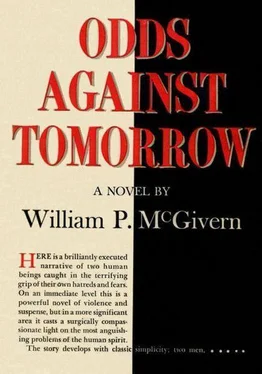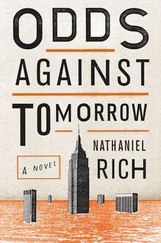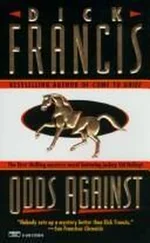The sheriff was still rubbing the bowl of the pipe between his hands. “Nancy and I are pretty close in some ways,” he said defensively. “But sometimes—” He looked steadily at Kelly, trusting him in this, but refusing to ask help of any man with averted eyes. “Sometimes I can’t understand her. Maybe I’m too standoffish.” The sheriff hesitated; in his code you didn’t go whining to strangers with your personal problems. He liked and trusted Kelly, but he was nonetheless a stranger. “I don’t know,” he said, lowering this standard with a sense of defeat. “I’d like to talk to her, to help her any way I can. But I just don’t know how.”
“She’s got to help herself,” Kelly said. “You can hold her hand maybe, but that’s about all. She’s got to forget him — you can’t do that for her.”
It took the sheriff an instant or two to understand what Kelly meant. Then he said “Yes,” and rubbed a hand roughly over his mouth, speaking against a painful constriction in his throat. So that was it... Why hadn’t she told him?
“She’s doing fine,” Kelly said, misunderstanding the bitterness in the sheriff’s eyes. “If he wasn’t smart enough to hold onto her, he’s no bargain.” He hesitated then, his cheeks suddenly hot. If the old boy didn’t know... “A stranger makes a good wall to bounce things off,” he said, inwardly cursing his tactlessness.
“Why didn’t she tell me about him?” the sheriff said so softly that Kelly had to lean forward to catch the words. “That’s what I’m wondering.”
Kelly felt like biting off his tongue. “I’m terribly sorry. Naturally, I thought—”
“Naturally. Naturally a girl tells her father. Who was he, by the way? Or are you supposed to keep her secrets?”
“There’s no sense huffing and puffing,” Kelly said quietly. “At her or at me.”
The sheriff was slightly startled by Kelly’s tone; not many men would use that voice with him when his temper was up. Then he smiled wearily, and said, “You’re right. I’m sorry.”
“He was a man she met in New York. They saw each other for a year or so. Then things changed. With him.” Kelly raised his hand and let it fall. “Your daughter took it like a big girl. No scenes, no recriminations, no rebound nonsense. She just packed up and came home.”
“I don’t understand her,” the sheriff said helplessly. “But that’s not her fault, is it? It’s mine. I just don’t understand.”
“You won’t be the last man to say that about a woman.” Kelly retreated gratefully into the protective cliché. He distrusted too-tidy explanations of emotional conflicts. And he distrusted people with quick solutions for them. Loose talk about Oedipus complexes and sibling jealousies made him uneasy. The amateur analyst might be right; that was the hell of it. Buckshot usually hit something. You could even hit a hornet with buckshot but that was no way to stop a swarm of them.
Things would work out. He believed in that philosophy because he was a hopeful man; he had learned to wait cheerfully.
So they didn’t get along. Well, that would work out. The sheriff was a demanding man without knowing it. He had grown taller and taller with the years and now he was too damned far from the ground. He needed to be brought to earth — to change a few diapers, get a flailing little foot in the eye occasionally, stock up his wallet with some new baby pictures. Solving her needs would solve his, Kelly figured. Making her happy would make him happy. It would be a nice job for some guy. Two birds with one stone. A rewarding kind of job. But it couldn’t be rushed; it needed patience and humor.
They heard footsteps on the stairs, and the sheriff stood up quickly, forcing the conversation from his mind. Kelly said, “Let me do the talking, will you? I know what their trouble is, I think.”
The sheriff nodded; his respect for Kelly had gone up considerably in the last few minutes. “You go ahead,” he said.
The doctor opened the door and ushered his daughter into the room. “Sit down and get nice and comfortable, honey,” he said. “This won’t take long, will it, Sheriff? We’ve told you everything we can remember.”
“We’ll be quick as we can,” the sheriff said. He smiled at the girl. “Feel better after your nap?”
“Yes, thank you.” She sat on the sofa with her slippered feet tucked under her, looking sweet and young and rested; but Kelly saw the nervousness in her tightly gripped hands.
He took a sheaf of notes from his pocket, and sat down in front of her. “You know what the subconscious is, I suppose, Carol.”
“Well, more or less.”
Kelly smiled. “That’s a good answer.” He realized that behind this teen-aged poise and dignity was a very frightened little child; he could see the pulse beating rapidly in her throat, and the quick rise and fall of her soft bosom.
“I was once in love with a very beautiful girl,” he said, with nothing in his voice to mark the comment as irrelevant.
“What?” the sheriff said, staring at him.
“This was quite a while ago. But she was a knockout, Carol.”
“Oh?” She looked interested. “What was she like? I mean, was she a blonde or a brunette or what?”
“I don’t remember,” Kelly said. “I struck out with her pretty completely. There was another guy with looks and money — so she foolishly brushed me off like a speck of lint.”
“How old was she?” Carol said doubtfully.
“She was ten,” Kelly said, “and very flighty and immature for her age.”
“You aren’t serious.”
“Yes I am, Carol,” Kelly said quietly. “I’m being very serious. I don’t remember what the girl looked like because I don’t want to. Part of my mind simply hides her from me, so I won’t worry about her. We forget things, Carol, without knowing we’ve forgotten about them — that’s our safety valve, a protective device we all use without realizing it.”
“But I’m not hiding anything from you. Really, I’m not.”
The doctor patted her shoulder. “Of course, honey.” He looked at Kelly. “But I know what you’re getting at — and believe me, I’ve tried to be honest.”
“You owe your lives to that Negro,” Kelly said. “He made a bargain to bring you back and he stuck to it. Even at the risk of getting a bullet through his head.”
“I know, I know,” the doctor said. “He saved Carol’s life and I can’t forget it. But I’ve tried my level best not to let that influence me.”
“I’m sure of it,” Kelly said. “But think about this possibility: you may be unconsciously trying to repay him for saving your lives. You don’t want to dredge up anything that might put his neck in a noose.”
“I’ll tell you this much,” the doctor said sharply. “When he’s caught, I’ll see that he gets the best lawyer in the state to defend him. That man behaved with courage and honesty — in spite of everything else he’s done.”
“Fine,” Kelly said. “Do everything you can for him. But think of this in the meantime: those men will move when it gets dark. They’re armed and desperate. Someone will get in their way. Think about that person for a second. A police officer with kids waiting for him at home, a salesman or a housewife, a young girl, maybe. Whoever it is may wind up dead. And you can’t help the Negro then. You can only help him now — before he’s hounded into more trouble.”
“I haven’t held back a thing,” the doctor said with a stubborn edge to his voice.
“Let’s go over a couple of points anyway,” Kelly said. “Forget about the car, the roads, the weather. Just concentrate on the living room of that house.”
“There is nothing more I can tell you. Floor boards of uneven width. Hand-hewn beams. We’ve gone through all this. There are hundreds of homes like that in the country. Old, pre-Revolutionary houses with two-foot stone walls, and fireplaces you can walk into. That’s what brought a lot of wealthy people into the area — the fun of renovating those old relics. I didn’t see anything distinctive. I was treating a wounded man and wondering if my daughter was going to be killed before my eyes. Maybe I missed something that would help you find the place. But can’t you understand that I wasn’t in the best possible mood to be taking an inventory.”
Читать дальше

![Уильям Макгиверн - Завтра опять неизвестность [английский и русский параллельные тексты]](/books/35168/uilyam-makgivern-zavtra-opyat-neizvestnost-angli-thumb.webp)









